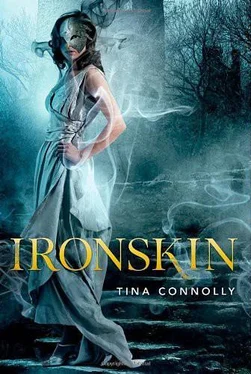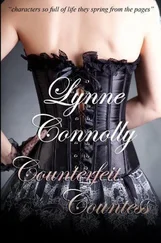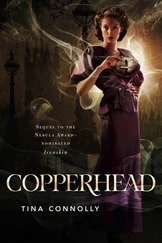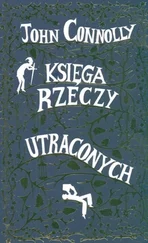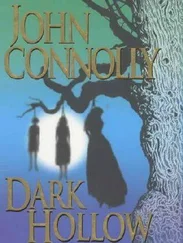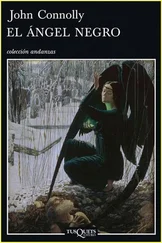Nina had said something to that effect the first day Jane met her, she remembered. “Since she had the surgery?” said Jane. “Aren’t you worried, then?”
Nina laughed again, the loose bandage swinging. “We’re cut from different cloth. She’s weak, born to her state—I had to fight for mine with tooth and décolletage. No silly paranoia will catch me.” She leered at Jane. “Besides, we both know the real reason she keeps coming back for ‘checkups.’ Now, where’s Edward?”
Edward and his endless supply of beautiful women. Inhuman, irresistible. Even Nina’s mask was captivating—Jane had to force her eyes not to linger on the turn of brow and line of cheek. She was suddenly sure it was all true, all of Nina’s insinuations, all that the gossip said. He must have been intimate with all of them, for that’s what real fey glamour did to you, and each of the women had a touch of that spellbinding, unstoppable allure.
All of them. The Prime Minister’s wife, whom he pretended to laugh at. Blanche. Nina. He denied any involvement behind their backs, but surely he turned around and mocked Jane behind hers. Nina probably knew all her secrets.
“Gone, I said,” said Jane. Nina lifted eyebrows at Jane’s sharp tone. No wrinkles appeared in that white forehead. “I’d go lie on the table upstairs if I were you. He’ll be back in the morning.”
“That might be what you’d do,” said Nina. “I’m going back to my room for celebratory drinkies. If you see any of the young men, send them my way. In fact, maybe I’ll go find them myself.”
“I don’t think so,” said Jane. She took Nina’s shoulder, propelled the woman back toward her room. Nina went quietly, mostly because she was still loopy, Jane thought. She jumped from topic to topic, played with her swinging bandages, and generally screwed Jane’s already taut and screaming nerves to the edge. Jane put her in her room with a sense of profound relief. “Stay in there till morning,” Jane said. “Or else.”
“Or else, or else,” mocked Nina. But she shut the door, and Jane drew a silent breath of hope that Nina would go to sleep.
Jane paced the hallway for hours. Her legs grew tired, a knot in her belly sickened with exhaustion, but she could not sleep any more than she could fly. Edward loved her, hated her—but no, put that aside yet again, and concentrate, Jane. What was the truth about her fey curse?
Something about her fey curse was also a gift—when not blocked by iron, she could sense emotions as keenly as if they were her own.
In the forest, Edward had felt for Dorie through his hands, as if they were showing him the path. (Don’t think of Edward.) His fey gift, capable of more than he knew.
And Dorie herself. Also fey-cursed, and strongly, too … but possibly capable of withstanding a fey takeover.
For that’s what had happened in the forest, hadn’t it?
A fey had entered Dorie, just as one had entered Blanche. Had entered Jane, but had left of its own accord. Dorie had fey inside her, Blanche had fey in that mask on her face. And Jane? Jane just had her curse. The fey curse.
Her head flew up with a start, realizing what the three of them had in common.
The fey substance. Call it a gift, call it a curse—it was both. The fey could not gift without cursing—and they could not curse without gifting.
The fey substance lacing her skin gave her these fey traits—emitting anger, sensing emotions. And more—her curse was affecting people less than she feared, because she was learning to control it. Imagining herself as water was not a silly visualization, but a true manipulation of the substance on her cheek. She was doing what Dorie did, in a far less skillful way.
But the fey substance still had one great drawback, a new wrinkle that no one had ever known.
The fey-cursed were vulnerable to the fey themselves.
The fey had never taken over live bodies before—only the shrapnel-flecked bodies of the dead. Because fey bombs were meant to kill. Because humans with fey substance in them tended to be dead.
But they had never had all these live bodies with fey smeared over them, upright and walking around. And Jane wasn’t thinking of the bedraggled and outcast ironskin, though it was true they were equally vulnerable.
The masks.
The masks that those women bought, that Edward put on. A hundred highly placed people, each of whom had turned herself into a host for a parasite: a silver birch waiting to be strangled by mistletoe.
Jane went to the window and looked through the mesh screen onto the back lawn. The maypole glinted in the first light of dawn, its orange and red ribbons hanging loose around it like a flame.
May Day. A time for celebration.
And all the guests who could be coaxed (the girls, mostly) would dance around it, never knowing that on several of their faces lurked a ticking time bomb.
The exact same substance that scarred Jane’s own cheek.
Fear riddled her heart, and with it, determination. It didn’t matter whether she was ugly or beautiful—she was just as in danger.
So she was determined to be normal. That desire had not lessened one whit. She would have the face she was meant to have, the simple whole Jane face. Perhaps the desire for normal was tangled up in her desire for Edward. Perhaps she was no better than the women who would change their face “as easily as a dress.”
If wanting to be herself was wrong, then so be it.
For once she was going to have exactly what she wanted.
Numb and taut, Jane went through the black early morning to his studio. She made her way to the workbench she had passed by earlier—her hand went to that cloth, thrown over his current project.
She stood there, fingers trembling.
Nina had called her new face pretty.
But what sort of pretty did she mean?
Jane almost fled. Almost was sick, almost ready to smash the mask without lifting the cloth.
She lifted the muslin.
Jane knew what she had feared when she saw it. Her own face stared up at her, white and pale, black eyes hollowed out.
But not her own face. Ten—a hundred times more lovely than her own face. Beauty that any girl would die to possess.
He had done a masterful job. She would be more lovely than Blanche, than Nina.
As beautiful as any fey.
“With a face like that, all men would be at your feet,” said Edward.
She whirled, finding him there, a black hole of absent moonlight. Pale, drawn, enervated. Sagging, sad, but the fierce words still came to attack him: “I didn’t ask for all men. What demon possessed you to make this?”
“You do not want to know.”
“I know all too well.” His warmth versus his chill—oh, she knew. She picked up the mask and shoved it on her own face.
The inside of the mask was cool on her skin. Sensuous, molding—like skin itself rather than cold clay. She peered out at him and it was like looking through binoculars the wrong way. Everything seemed distant, cut off. “How do you like me now?”
His eyes were invisible. “I like you as you are.”
She could not hear in his voice whether that meant “before” or “now.” Could not feel it, either. She was turned all upside down by the clay on her face. It seemed to thrum with implied power, but differently than her curse had, so that she would have to recalibrate everything she knew.
She turned past him to the mirror at the end of the room. Her eyes looked out from behind the mask. Her own visage, yet transformed. Enduring. Only her frightened eyes marred its regal beauty.
He came up behind her, slid a hand to her waist.
She could not move from the mirror.
“You think I mock you. You think I want you to be other than you are.” He drew his fingers down the cheek of the mask—she felt it as a coldness that slid over her real skin, her damaged skin. “How could you not?”
Читать дальше
